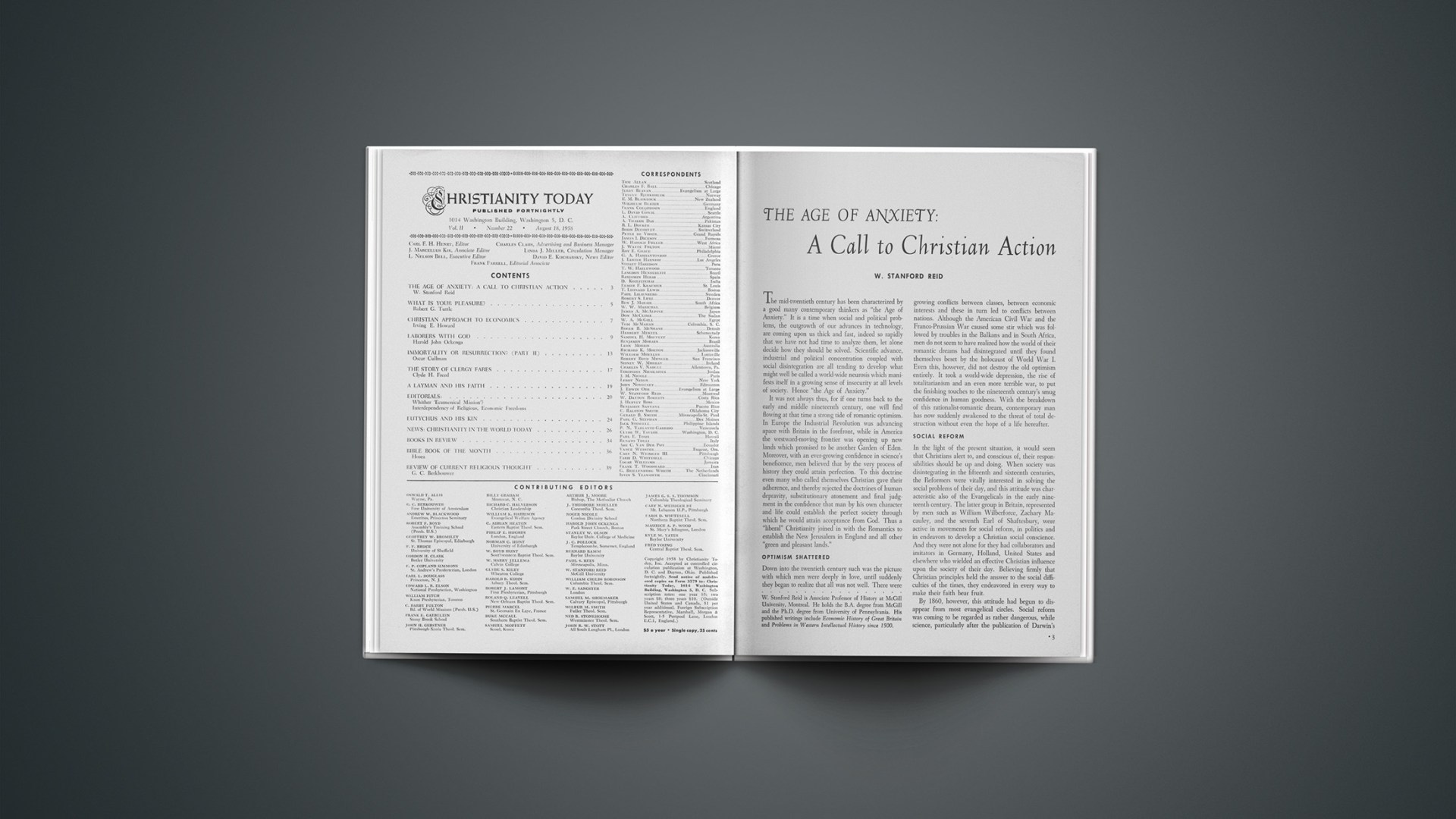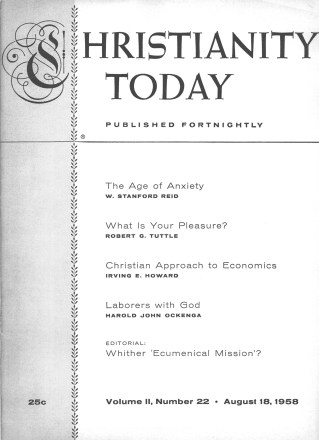The mid-twentieth century has been characterized by a good many contemporary thinkers as “the Age of Anxiety.” It is a time when social and political problems, the outgrowth of our advances in technology, are coming upon us thick and fast, indeed so rapidly that we have not had time to analyze them, let alone decide how they should be solved. Scientific advance, industrial and political concentration coupled with social disintegration are all tending to develop what might well be called a world-wide neurosis which manifests itself in a growing sense of insecurity at all levels of society. Hence “the Age of Anxiety.”
It was not always thus, for if one turns back to the early and middle nineteenth century, one will find flowing at that time a strong tide of romantic optimism. In Europe the Industrial Revolution was advancing apace with Britain in the forefront, while in America the westward-moving frontier was opening up new lands which promised to be another Garden of Eden. Moreover, with an ever-growing confidence in science’s beneficence, men believed that by the very process of history they could attain perfection. To this doctrine even many who called themselves Christian gave their adherence, and thereby rejected the doctrines of human depravity, substitutionary atonement and final judgment in the confidence that man by his own character and life could establish the perfect society through which he would attain acceptance from God. Thus a “liberal” Christianity joined in with the Romantics to establish the New Jerusalem in England and all other “green and pleasant lands.”
Optimism Shattered
Down into the twentieth century such was the picture with which men were deeply in love, until suddenly they began to realize that all was not well. There were growing conflicts between classes, between economic interests and these in turn led to conflicts between nations. Although the American Civil War and the Franco-Prussian War caused some stir which was followed by troubles in the Balkans and in South Africa, men do not seem to have realized how the world of their romantic dreams had disintegrated until they found themselves beset by the holocaust of World War I. Even this, however, did not destroy the old optimism entirely. It took a world-wide depression, the rise of totalitarianism and an even more terrible war, to put the finishing touches to the nineteenth century’s smug confidence in human goodness. With the breakdown of this rationalist-romantic dream, contemporary man has now suddenly awakened to the threat of total destruction without even the hope of a life hereafter.
Social Reform
In the light of the present situation, it would seem that Christians alert to, and conscious of, their responsibilities should be up and doing. When society was disintegrating in the fifteenth and sixteenth centuries, the Reformers were vitally interested in solving the social problems of their day, and this attitude was characteristic also of the Evangelicals in the early nineteenth century. The latter group in Britain, represented by men such as William Wilberforce, Zachary Macauley, and the seventh Earl of Shaftesbury, were active in movements for social reform, in politics and in endeavors to develop a Christian social conscience. And they were not alone for they had collaborators and imitators in Germany, Holland, United States and elsewhere who wielded an effective Christian influence upon the society of their day. Believing firmly that Christian principles held the answer to the social difficulties of the times, they endeavored in every way to make their faith bear fruit.
By 1860, however, this attitude had begun to disappear from most evangelical circles. Social reform was coming to be regarded as rather dangerous, while science, particularly after the publication of Darwin’s Origin of Species, was held by many to be demonic. To this outlook on life and partially as a result of it, Christian circles added a principle of “separation” based upon the idea that society was absolutely evil, and one should withdraw from it as far as was humanly possible. Politics was something in which Christians should not participate, art and literature were of very dubious moral value, and social reform was useless since it did not accomplish the individual’s regeneration. Increasingly, Christians began to over-stress the fact they were “not of the world,” apparently forgetting that they were still in it, and still had certain social responsibilities.
With this anti-social tendency, there arose an ever-increasing personal emphasis, strengthened by the revivalist preaching of Dwight L. Moody and R. A. Torrey. “Winning souls” became the one interest of the evangelical churches and individuals. Social reform, politics, education and similar matters could all be left to the “social gospelers.” The true Christian was but a pilgrim here, so to him the problems of this world were really unimportant.
The personal emphasis was, of course, very necessary, as all Christians will realize; for it is only as one takes the personal step of placing one’s faith in Christ as Saviour that one receives eternal life. But this can be only the beginning, for one must also manifest God’s grace and righteousness in every part of life (Titus 2:11 f.). Christian concepts of, and interest in, justice, righteousness and truth are to be manifested in the lives of Christians, and this in turn implies responsibility in every sphere of human existence. With a few exceptions, such as the movement headed by Abraham Kuyper in the Netherlands, this was ignored. For the last 35 to 40 years, therefore, evangelical Christians have tended to hide themselves from “the world,” holding that they should not participate in such “worldly” matters as politics or social and economic reform.
The Christian Answer
In our own day, however, even the most optimistic humanists seem to have reached the limit, the end of their tether. Economically, politically and internationally it looks as though Western civilization may disintegrate at any moment, giving rise to the most rigorous totalitarianism ever known to history. To this state of affairs, the Christian can no longer close his eyes. If, as evangelicals so often proclaim, Christianity has the answer to the world’s problems, then they should be prepared to show what it has to offer. Merely a series of round condemnations, or the mouthing of platitudes and principles that applied to the political and economic situation of the 1870s is not enough. One must face the difficulties of the here and the now.
What should be the Christian attitude to the present “welfare” trend? What about international relations? What should be the Western world’s attitude and dealings with Red China, Russia and, closer to home, the U.N.? There has been much fury, much sentimentality and much emotionalism introduced into these questions, but what is the Christian position, based upon biblical principles?
One could even go further to raise the problems posed by unemployment, capital accumulation and numerous other matters in the field of economics. Then too there is the pressing problem of education, racial segregation and the like. Does Christianity have anything to say on these matters? If so, it would be well for Christians to know what it is, in order that they may speak as Christians, and in elections vote as those whose ultimate allegiance is not to any temporal political party but to him who is Lord of lords and King of kings.
This means that Christians who have some knowledge and understanding of such matters as economics, politics, sociology and other such disciplines are responsible to set forth in these fields, as clearly as possible, the implications of the Christian faith. But the experts are not the only ones who have a responsibility. Every Christian is involved, for each one has an obligation to see that the scholar has the opportunity to set forth his views, unrestricted by ancient and antique notions which, though they may be hallowed by age, have little relation to the Christian faith. Moreover, every Christian has the duty of endeavoring to understand, criticize and judge for himself any and all views set forth in order that he know what Christianity’s answer is to contemporary difficulties.
In such studies and discussions, and in the presentation of solutions for the various complexities that beset our civilization, Christians will be bringing Christ to men. True, men will not accept him without the inner working of the Holy Spirit; but they will see that he has the answer to their problems, social as well as personal. In such expositions Christians will also be faced with their responsibilities. They will be thinking of the wider implications of their faith, and in this they will be enabled to perform the important task of “the salt of the earth”—for salt to be effective must be mixed in with that which is to be salted. The Christian must go into the world with a full Christianity that is the salvation of the world.
This is the challenge of “the Age of Anxiety.” The world may well be in a worse condition than it has been since the fifteenth century. For this situation Christians are, in at least some measure, responsible; and this means that they have now, as never before, a duty to show how Christianity can meet modern problems. The question is: Are we ready to meet the challenge?
W. Stanford Reid is Associate Professor of History at McGill University, Montreal. He holds the B.A. degree from McGill and the Ph.D. degree from University of Pennsylvania. His published writings include Economic History of Great Britain and Problems in Western Intellectual History since 1500.










